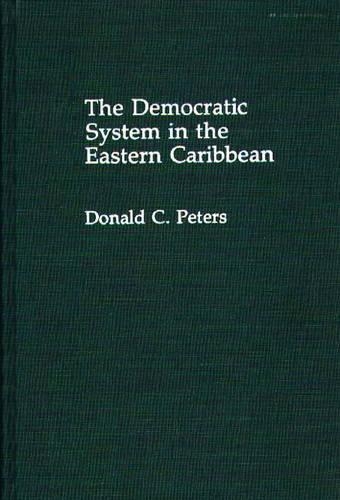
The Democratic System in the Eastern Caribbean
(Hardback)
Publishing Details
The Democratic System in the Eastern Caribbean
By (Author) Donald C. Peters
Bloomsbury Publishing PLC
Praeger Publishers Inc
30th June 1992
United States
Classifications
Tertiary Education
Non Fiction
321.809729
Physical Properties
Hardback
256
Width 156mm, Height 235mm
595g
Description
What are the unique features of the governing structures and political systems of the small states and former British colonies of the East Caribbean Are they truly democratic Do the decision makers manipulate their peoples And what can we learn about the political modernization of developing countries through an in-depth study of the governing of Antigua, Dominica, Grenada, St. Lucia, St. Vincent and the Grenadines, St. Kitts/Nevis and Montserrat This is an analysis to date of these little-known democracies, one that should interest students in comparative government and Latin American studies. This study provides a conceptual framework for comparing East Caribbean governments with other Western political systems, for assessing the democratic and authoritarian characteristics of seven small states, and for analyzing the impact of modernization on the political development of these developing nations. The study describes the political institutions in the East Caribbean, the role of political parties, the church, and class, and shows how the particular social and economic problems affect the governments and people in the region.
Reviews
.,."well written and theoretically provocative, a book that Caribbean scholars, researchers, students, aspiring politicians, and elected officials will find useful and informative."-New West Indian Guide
...well written and theoretically provocative, a book that Caribbean scholars, researchers, students, aspiring politicians, and elected officials will find useful and informative.-New West Indian Guide
Through most of the study (a doctoral dissertation at the University of Massachusetts), the author aimlessly circles his problem: the authoritorian behavior of elected regimes in the Eastern Caribbean. He has some useful things to say about constitutional restrictions on human rights, the Catholic Church, emigration, and the Organization of Eastern Caribbean States. But the seven "states" themselves (St. Kitts-Nevis, Antigua-Barbuda, Montserrat, Dominica, St. Lucia, St. Vincent, and Grenada) are never brought sufficiently to life to permit comparative analysis. Nor is "Westminsterism" (i.e., rule by government and opposition) examined closely enough to confirm the "authoritarian" claim. In the end Peters seems to acknowledge that the real problem might be "bad losers" not "bad rulers." Confusing throughout is his interchanging use of "authoritarian" and "authoritative." Very limited sources. Recommended only for specialized collections.-Choice
..."well written and theoretically provocative, a book that Caribbean scholars, researchers, students, aspiring politicians, and elected officials will find useful and informative."-New West Indian Guide
"Through most of the study (a doctoral dissertation at the University of Massachusetts), the author aimlessly circles his problem: the authoritorian behavior of elected regimes in the Eastern Caribbean. He has some useful things to say about constitutional restrictions on human rights, the Catholic Church, emigration, and the Organization of Eastern Caribbean States. But the seven "states" themselves (St. Kitts-Nevis, Antigua-Barbuda, Montserrat, Dominica, St. Lucia, St. Vincent, and Grenada) are never brought sufficiently to life to permit comparative analysis. Nor is "Westminsterism" (i.e., rule by government and opposition) examined closely enough to confirm the "authoritarian" claim. In the end Peters seems to acknowledge that the real problem might be "bad losers" not "bad rulers." Confusing throughout is his interchanging use of "authoritarian" and "authoritative." Very limited sources. Recommended only for specialized collections."-Choice
Author Bio
DONALD C. PETERS is a member of the Faculty in the Department of Behavioral Sciences, General College, University of Minnesota, and is Assistant Vice President of Student Affairs. He has taught courses in political science and lectured at colleges at both the national and international levels.
